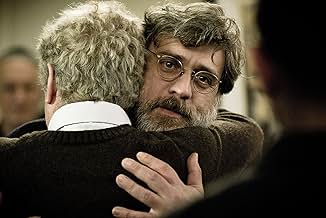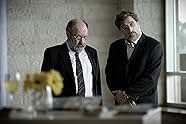Ajouter une intrigue dans votre langueEliezer and Uriel Shkolnik are father and son as well as rival professors in Talmudic Studies. When both men learn that Eliezer will be lauded for his work, their complicated relationship re... Tout lireEliezer and Uriel Shkolnik are father and son as well as rival professors in Talmudic Studies. When both men learn that Eliezer will be lauded for his work, their complicated relationship reaches a new peak.Eliezer and Uriel Shkolnik are father and son as well as rival professors in Talmudic Studies. When both men learn that Eliezer will be lauded for his work, their complicated relationship reaches a new peak.
- Nommé pour 1 Oscar
- 14 victoires et 9 nominations au total
- Eliezer Shkolnik
- (as Shlomo Bar Aba)
- Yehudit Shkolnik
- (as Alisa Rosen)
- Dikla Shkolnik
- (as Alma Zak)
- Committee Member
- (as Shmulik Shilo)
- Committee Member
- (as Albert Illouz)
- TV Host
- (as Jacky Levy)
Avis à la une
Most parents wish for true happiness for their children. If the professional success of their offspring far exceeds their own ... it is a reason to swell with parental pride. But what happens when father and son choose similar paths? What happens when animosity builds as the father's life work (30 years of research) is deemed unnecessary and irrelevant? What happens when the son becomes publicly revered and adored for his populist writing? Well, in the case of father Eliezer (Shlomo Bar-Aba) and son Uriel (Lior Ashkenazi), we get strained relations and a thesis on the pitfalls of pride and ego.
All of that is sufficiently fascinating for a story, but here we get an even more severe test of human nature. The father is erroneously informed that he has won the prestigious Israel Award, providing vindication and meaning to his work and well, his being. See, the award was supposed to go to the other Professor Shkolnik ... yes, his son. This much is shown in the trailer, but the true guts of this story is what happens after this mistake.
There are a few tremendous scenes in the film, but two really jumped out for me. In an early scene, the son is receiving yet another reward and he is attempting to provide some credit for his father's inspiration. However, the words seem to add credence to the irrelevancy instead. The best part? The camera never leaves the face of the father and he sits quietly listening in immeasurable pain. The other scene takes place in a beyond cramped meeting room for the Award committee to discuss the mistake with Uriel. The manner it is filmed and the choreography more than make up for the fact that the group of brilliant people never thought to find a more suitable meeting place.
The score of the film is one that I would appreciate more without having the film playing. The music is wonderful, but often distracting to the moment. It is interesting to note how it changes along with the posture and walking pace of Eliezer after he is informed of his award. One need not be an academic researcher or writer to understand the damaged relationship between father and son ... and how it has impacted wives, mothers and sons. That's a story that is painful in any language.
The film centers on Eliezer Shkolnik (Schlomo Bar Aba), an aging Talmudic scholar and philologist, who has become a bitter and aggrieved man after having been passed over for the prestigious Israel Prize for twenty years. Eliezer arrogantly denounces the selection committee for the Prize as people who have forgotten the meaning of true scholarship. He has spent his career researching corrupted Jewish texts that deviate from the original Talmud, but whose only recognition has been a citation in a footnote.
Ill at ease in the hallowed walls of academia and in relationships in general, Eliezer sleeps in his office and only ventures out to go to the library. He continues to schedule classes even though as little as one or two people enroll. His relationship with his wife Yehudit (Alisa Rosen) appears strained and distant and, when he is at home, he blocks out the world by putting on gigantic yellow earphones. His behavior is contrasted with that of his more sociable and outgoing son, the bearded Uriel (Lior Ashkenazi) who is also a Talmudic scholar but one whose work is more attuned to popular tastes. His father, unfortunately, is generally disdainful, calling him a "folklorist" and a scholar subservient to the prevailing academic status quo.
The film opens with Eliezer sitting in an auditorium with a dour and rigid look on his face as Uriel is being inducted into a scholarly academy, an honor which the father has never received. Despite the downbeat beginning, the first part of the film is fairly lighthearted with Cedar entertaining us with inter-titles describing the background of the characters and Amelie-like cutesy cinematic tricks bouncily scored by Amit Poznansky. Halfway through, however, the film takes a more dramatic turn when Eliezer learns that he has finally won the Israel Prize after waiting for twenty years, an event that threatens the resentment he clings to so obsessively.
Unfortunately, a ridiculous faux-pas by the Nominating Committee only serves to place more obstacles in the father-son relationship. It is, unfortunately, not an easily correctable mistake but a true ethical dilemma and one that precipitates a confrontation between Uriel and the academic committee in a tiny room, an absurd scenario that would be funny if it did not have so many potential disastrous ramifications. The brunt of Uriel's attack is directed towards Yehuda Grossman (Michah Lewesohn), a scholar who has either rejected or ignored his father's work and whose publication of his own Talmudic discovery undermined all the meticulous research Eliezer had been doing for years. In the film's most dramatic sequence, the confrontation escalates into highly articulated personal attacks, ultimatums, and even a bit of physical violence.
While Uriel is defending his father at the committee meeting, Eliezer is doing the opposite, criticizing his son during an interview, lumping him in with those whose Talmudic studies he considers to be shallow and superficial. Needless to say, this even further exacerbates their troubled relationship. Footnote is an engaging film marked by exceptional performances by Lewesohn, Ashkenazi, and Bar Aba and you can enjoy it whether or not you care very much whether or not the current version of the Talmud correctly reflects the original ancient texts. The depiction of Eliezer, however, is one-dimensional and the father's incessant self-righteousness turns the film into a sour and mostly unpleasant affair. In addition to its depressing tone, numerous plot points are introduced and then dropped without further comment.
Eliezer is seen talking to another woman, a sequence that leads to a bedroom discussion of the event between Uriel and his wife Dikla (Alma Zack), but soon morphs into an argument, its purpose obscure. Also in another thread that goes nowhere except to add to the general unpleasantness, Uriel's son Josh (Daniel Markovich) goes on a hiking trip and comes home having to confront his father's anger at his ostensible lack of ambition or goals. Although the film's loose ends are particularly annoying, we are caught up in its very compelling scenario. Cedar knows how to build up the tension and we eagerly await some sort of resolution but, as is the trend of late, the director feels that his film is more valuable as a gigantic set-up than as a satisfying resolution and the result is a film that leaves us thinking that the projectionist inadvertently cut out the best part of the movie.
The premise is fairly straightforward. A father and son are both philogy professors at the Hebrew University of Jerusalem. Eliezer Shkolnik is an old school researcher who believes findings are only valid if research is conducted in the proper scientific method, while his son, Uriel, follows the more modern philosophy. Eliezer loathes the popularity and acceptance of the current methods, and is so stubborn he even refuses to cancel one of his classes even though only one student is signed.
Having background on research methods or philology is not necessary however, when it comes to following along the movie. Shlomo Bar'aba and Lior Ashkenazi, as Eliezer and Uriel respectively, both make sure to humanize their characters and portray their conflicting ideals by showcasing conflicting personalities as wells.
The plot gets really interesting when Eliezer finds out he has been voted the winner of the Israel Prize, forcing him to rethink how he feels his colleagues, and the field in general. However, Uriel soon gets a phone call that will shake things up even more.
Unfortunately, Footnote does not deliver a satisfying conclusion, at least not a memorable one. The tension is slowly built up really well as the film cuts deeper into the plot, yet when the time comes for a huge clash, the film ends up kinds of just floating around not knowing the right time to fade out. However, the meat of the film is too good to be ignored, as both Bar'aba and Ashkenazi deliver performances you won't soon forget.
The movie makes sure to avoid tabloid-style situations. It takes a serious approach to the situation. Probably the most effective scene is when the son meets the Israel Prize committee in a cramped office and reminds them of the hypocrisy of their decision to deny his father the prize. Nonetheless, the tension between father and son remains. In the end, it's a really good movie. I haven't seen many Israeli movies, but now I would like to.
Le saviez-vous
- AnecdotesJoseph Cedar is the son of the Israel Prize recipient, Haim Cedar.
- GaffesAt around 38:00, when Uriel enters the room that the committee is meeting in for the first time, he can open and close the door easily. But when he returns with a chair a few seconds later, suddenly there's not enough space to close it, despite his chair not being in the way.
- Citations
Uriel Shkolnik: [to a student] I will tell you something that my father told me once: Your work has many things correct and many things innovative. Unfortunately, the innovative things are not correct and the correct things are not innovative.
- Crédits fousThe credits for the major cast and crew members all have the initial letters of their names in bold, echoing the plot device that causes the confusion between the father and son.
- ConnexionsFeatured in At the Movies: Cannes Film Festival 2011 (2011)
Meilleurs choix
- How long is Footnote?Alimenté par Alexa
Détails
- Date de sortie
- Pays d’origine
- Site officiel
- Langue
- Aussi connu sous le nom de
- Down the Hill
- Lieux de tournage
- Sociétés de production
- Voir plus de crédits d'entreprise sur IMDbPro
Box-office
- Montant brut aux États-Unis et au Canada
- 2 007 758 $US
- Week-end de sortie aux États-Unis et au Canada
- 47 528 $US
- 11 mars 2012
- Montant brut mondial
- 2 451 259 $US
- Durée1 heure 47 minutes
- Couleur
- Mixage
- Rapport de forme
- 2.35 : 1
Contribuer à cette page





































